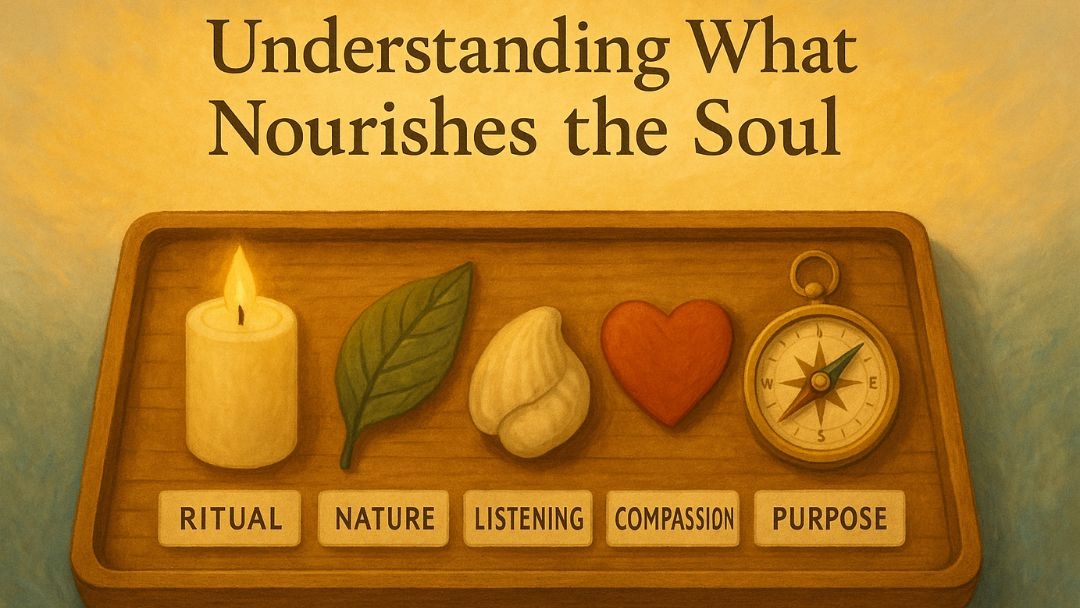What Is Spiritual Health? Is It Important for Your Health and Well-Being?
Good spiritual health balances the physical, social, emotional, and psychological aspects of our lives. Learn why spiritual wellness is important for your overall well-being, signs you are spiritually healthy, and tips to help you achieve spiritual health.


Back
6 mins read
Sometimes, in the middle of my daily routine, I catch myself feeling a quiet ache, like something deeper is missing. Even when everything seems fine on the surface, there’s this inner tug, a longing for something more meaningful. If you’ve ever felt that, too, I believe it’s your spirit asking for attention.
Spiritual health, to me, is one of the most personal and often misunderstood parts of our well-being. It’s deeply subjective, and it’s no surprise that it’s often the most overlooked among the 8 dimensions of wellness.
For me, spirituality isn’t just about religion—it’s a journey inward. It’s about discovering who I am at my core, what I value, and how I connect with the world and something greater than myself. It’s the part of me that seeks meaning, peace, and purpose.
So, what does spiritual health really mean?
And why does it matter so much in a world that often tells us to focus only on what’s visible? Let’s dive in and explore what it looks like to take care of our spiritual well-being.
Spiritual Health Definition: What Is It?

Spiritual health refers to a person’s sense of peace, purpose, and connection to something greater than themselves — whether that’s a higher power, nature, humanity, or the deeper aspects of their inner self. It’s the aspect of well-being that involves meaning, values, and the beliefs that guide how we live our lives.
More than just a religious concept, spiritual health is a broad, inclusive dimension of wellness that integrates with physical, emotional, mental, and social health. It involves self-reflection, ethical living, compassion for others, and a pursuit of deeper understanding.
At its essence, spiritual health acts as a foundation for balance, helping individuals align their values with their actions and find harmony in their lives.
Understanding spiritual health begins with exploring the idea of spirituality itself—not just as a belief system, but as a personal journey toward authenticity, inner peace, and interconnectedness.
Aspects Of Spiritual Health

According to recent surveys, “being more spiritual” is often listed among the top New Year’s resolutions. But what does that actually mean? What does it look like to be spiritually healthy?
Spiritual health isn’t about checking off a box—it’s an ongoing process of growth, connection, and inner alignment. At its foundation, it includes two core dimensions: a connection to the divine and a sense of inner wholeness.
- Connection to the Divine: A personal relationship with a higher power—whether that’s God, the universe, or something else—that brings peace, trust, and perspective.
- Wholeness and Purpose: Living in alignment with your values, beliefs, and a sense of direction that gives life deeper meaning.
Beyond these foundations, spiritual health consists of several key aspects:
- Hope and Resilience: A will to live and a hopeful outlook, even during life’s most difficult moments.
- Meaningful Experiences: Seeking out purpose-driven activities and relationships that feed your soul.
- Altruism: A selfless concern for the well-being of others and a desire to make a positive impact.
- Wonder and Reverence: A deep respect for the mysteries of life, including what cannot be fully explained or understood.
- Intuitive Understanding: A sense of knowing that doesn’t rely solely on logic but is felt deeply and often guided by faith.
- Devotion: A commitment to something beyond the self—often expressed through prayer, meditation, or service.
Spiritual health is not static; it evolves with you. The more you engage with these aspects, the more grounded, peaceful, and purpose-driven your life becomes.
Spiritual Wellness: Connection to Other Dimensions of Health
Does spiritual wellness influence your overall health and well-being? Absolutely.
While we often focus on physical, mental, and emotional health—through exercise, rest, nutrition, and relationships—spiritual wellness is the quiet force that helps tie it all together. It's not just a bonus; it plays a central role in creating a balanced life.
Unlike other dimensions that deal with the body and mind directly, spiritual health explores the intangible—meaning, purpose, and our connection to something greater, whether that’s a higher power, nature, or simply inner peace.
Think of it as the missing piece that helps all other aspects of wellness feel whole.
In times of trauma, grief, or uncertainty, spiritual wellness often becomes a guiding light — offering comfort, clarity, and a sense of hope when everything else feels out of balance.
Signs of Spiritual Wellness

Even though spiritual health is very personal to each individual, there are some signs that one is developing a strong spiritual life. These can include:
- Feeling of contentment: A sure sign of being spiritually healthy is a feeling of contentment with one's life and the world in general. This often manifests as an inner peace that can be experienced even in the midst of chaos and hard times.
- A sense of purpose: People with good spiritual well-being clearly understand why they are here and what they want to do with their lives. They can use this sense of purpose to guide their decisions and actions.
- Compassion and empathy: Do you genuinely care about the well-being of others and try to put yourself in their shoes, offering support and understanding? If so, you're among the lucky few who exude this virtue.
- Moral compass: Knowing right from wrong and following a moral code is a sign of spiritual health. When you practice moral integrity and honor your values, it brings about a feeling of inner peace.
- Gratitude: Mindfully acknowledging what you have and the life experiences that have shaped you is a great sign of spiritual health. When you're spiritually healthy, gratitude becomes a natural part of your life. You appreciate the simple joys, the beauty around you, and the blessings that come your way. It's like having a heart overflowing with appreciation.
Factors That Can Impact Spiritual Health

Just like your mental, emotional, and physical health, your spiritual well-being can be impacted by a variety of factors. Here are some things that can have a negative effect on your spiritual health.
- External stressors: Things like a hectic lifestyle, financial pressures, or relationship issues can negatively impact how spiritually healthy you are. These factors make it difficult to take time out for spiritual reflection and practice and wreak havoc on your sense of inner peace.
- Internal stressors: If your inner dialogue is filled with self-destructive or negative thoughts, it can take a toll on your spiritual health and well-being. Too often, we focus on our weaknesses rather than our strengths, making it hard to access our spiritual power.
- Religious problem: Most people don't realize that religion can also be a source of stress. If your faith community is not supportive or if you have difficulty fitting in, these can lead to spiritual distress. Of course, we're not advocating that you choose a religious community solely based on how it makes you feel. However, it is important to be mindful of how your spiritual beliefs and practices impact your overall well-being.
- Social pressure: We live in a time when social media and digital communication influence is at an all-time high. It can be hard to separate what is "real" from what we see on our screens, and it can be difficult to know how our beliefs and values align with what is being said by others. This confusion can lead to feelings of guilt, shame, or confusion, which can hurt our spiritual and mental health too.
- Loss or questioning of faith: Another factor that can impact spiritual health is the loss or questioning of faith. Experiencing a traumatic event, the death of a loved one, or other life changes can cause us to question our belief system or even reject it altogether. This can be a difficult process and is often accompanied by feelings of grief, anger, or confusion.
Tips to Nurture Spiritual Health

Spiritual well-being is a personal journey—one that invites reflection, connection, and growth. Whether you're deepening your existing beliefs or simply seeking meaning, nurturing your spiritual health can bring clarity and peace.
Here are seven practical ways to cultivate spiritual well-being:
- Set aside time for spiritual practice: Whether it’s prayer, meditation, or daily rituals, choose what brings you calm and consistency.
- Reflect regularly: Journaling, quiet time, or inner questioning can help you align with your values and purpose.
- Stay present: Practicing mindfulness helps you engage more deeply with each moment and strengthens your spiritual awareness.
- Show kindness and compassion: Be mindful of how you treat others—acts of empathy enrich both your life and theirs.
- Connect with nature: Step outside and observe the natural world. It’s a powerful way to feel grounded and connected to something greater.
- Practice gratitude: Pause to appreciate life’s blessings—big or small. Gratitude fosters peace and perspective.
- Engage in spiritual activities: Attend services, meditate, pray, or explore teachings that align with your beliefs. These practices reinforce your connection to the sacred.
Take Care of Your Spiritual Health!

Most of your spiritual health comes from within, and cultivating good spiritual health is an ongoing journey. It requires time to pause and reflect on what brings you joy, peace, and inner strength. Take time to nourish your spirit, nurture your relationships, and believe you can make a positive difference in the world.
The tips in this article are the first step towards achieving a sense of spiritual wellness and satisfaction in life.
And here's our bonus tip!
Consider taking the Enneagram personality test, which has spiritual undertones. It can provide insights into your personality, motivations, and behavior patterns, helping you on your spiritual journey. You can also access a wide variety of resources that will help you on your spiritual journey in the BrainManager free member area.


Return to Blog





